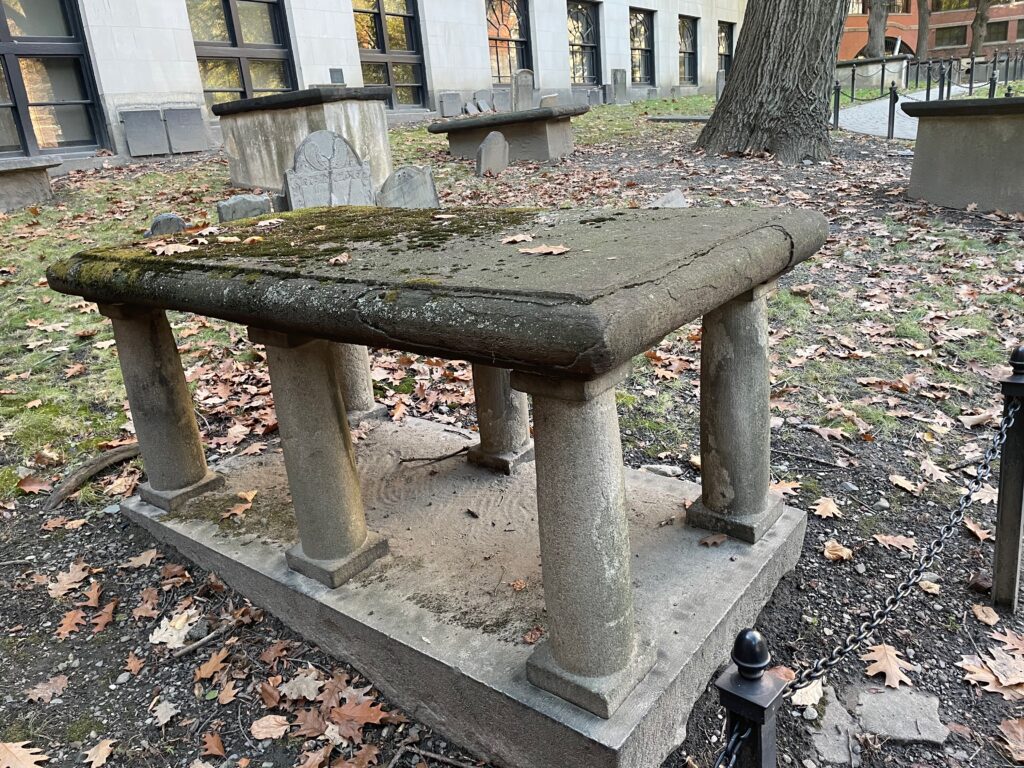Erik Visits an American Grave, Part 1,289
This is the grave of Samuel Willard.

Born in 1640 in Concord, Massachusetts, Willard grew up in the early elite of Concord. In fact, his father was one of the town’s founders, an initial Puritan immigrant. As was common in these days, his father survived his first two wives and married a third and in total, sired seventeen children. Willard entered Harvard in 1655 and graduated in 1659. He then continued for the very rare master’s degree of that time; in fact, he was the only one in his class to continue for those extra years for an advanced degree. I really don’t know much about what that looked like as my knowledge of seventeenth century higher education is basically none.
In any case, Willard became a minister, as did most Harvard graduates. He was first in Groton, which was right on the frontier at that time. He was there by 1663 and then when the town’s lead pastor died, he was asked to stay on and take over permanently. Groton was one of the towns that was wiped out by the tribes in King Philip’s War, when, unfortunately, they were unable to wipe the Massachusetts Bay Colony off the map and end the white genocide taking place against them. Lot of whites died in that, though not Willard.
After the destruction of Groton and the massive genocide that followed the end of King Philip’s War, Willard moved to Charlestown and then Boston, where he became one of the city’s leading ministers. He saw the witch trials in Salem with deep suspicion and began to speak out against them when that was risky. He had studied odd behavior that the Puritans associated with witches and just didn’t really believe that’s what it was.
This is a moment to state that it’s hard to overestimate just how much pre-modern superstition was in Puritan society. I don’t really teach the first half of the US history survey anymore since we hired actual early Americanists several years back. But when I had to cover that, I often used this primary source reader on the Salem witch trials. It was really quite fascinating, both for myself and really for the students too, or at least as much as they can be in a general education requirement course they don’t really want to be in. If a cow gave birth to a stillborn calf, it wasn’t that, well, this happens sometimes. No, they would look at the fetus, see it as monstrous, and then wonder who or what turned the cow into a sanctum of witchcraft. For people we see as very godly or whatever, Satan, devils, witches, they were just everywhere. So something like Salem isn’t really that surprising in context. Willard co-wrote Some Miscellany Observations on Our Present Debates Respecting Witchcraft in 1692, a text about the whole case.
Anyway, later in his career, Willard became seen as a suspicious character himself, not for witchcraft, but for being too friendly for the Anglican church. As the crown began seeking more control over their American colonies, it named Edmund Andros governor in 1686. He wanted the use of a church for his Anglican services. Boston was horrified. And when Willard agreed to open his church, Old South Church, for Andros, it was seen as a sellout to the forces of the crown and not Puritan enough religion. Incidentally, you can visit Old South Church today and it is pretty cool.
Old South was the church of the burgeoning Boston elite. Willard was highly intelligent and pretty elite himself so he created a comfortable place for these newly wealthy men. In fact, he was noted for sermons that fed into the commercial worldly lives these people had made. He frequently referred to commerce in his sermons and urged parishioners to think of commerce and religion in similar frameworks. He wasn’t some sort of early progenitor of the prosperity gospel. That wouldn’t have made sense to him. But in a land where successful trade and growing wealth was seen with suspicion by a lot of Puritans, he provided a framework for them to consider themselves pious while also engaging in their successful businesses. This was a sharp change from the early Puritan and more extreme Protestant movements in places such as Geneva that saw commerce as directly antithetical to their religion. Rather, for Willard, England and especially its Puritan colonies were signs of great civilization in the world, God’s gift to the globe. And so being in commercial activities around the globe was spreading a great civilization and religion. For all of this, I am borrowing from Mark Valeri’s 2010 book Heavenly Merchandize: How Religion Shaped Commerce in Early America, which is a term he borrowed from Willard for the book title. Basically, it was for this information that I chose Willard as someone to profile in this series.
Willard was also one of the most learned ministers in Boston. In 1701, the position of president of Harvard opened up. The school did not actually fill the position for a very long time, but Willard, who was its vice-president, filled the position in an acting role for the next six years, until 1707. And he only gave that up because he died. Willard was 67 years old.
Samuel Willard is buried in Granary Burying Ground, Boston, Massachusetts.
If you would like this series to visit other American religious figures, you can donate to cover the required expenses here. Billy Graham is in Charlotte (please send me here, you know you want this grave post) and Dwight Moody is in Northfield, Massachusetts. Previous posts in this series are archived here.


